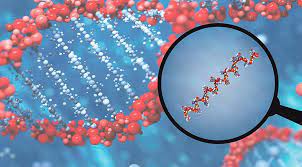BREAKING! Scientist Identify Four Human Host Exosomal miRNAs That Inhibit SARS-CoV-2. Varying Amounts In Individuals Explains Different Outcomes!
Source: Latest COVID-19 Research Sep 12, 2021 4 years, 5 months, 2 weeks, 1 day, 4 hours, 43 minutes ago
Latest COVID-19 Research: Chinese researchers from Nanjing University, Wuhan Institute of Virology, National Center of Gerontology at Beijing Hospital and the Army Engineering University of PLA have in a new breakthrough study identified 4 human host exosomal miRNAs that possess antiviral properties and are able to inhibit the SARS-CoV-2 coronavirus. Furthermore it was found that varying amounts of these miRNAs and also the ‘quality’ of these miRNAs especially in the elderly could explain why different individuals manifest varying COVID-19 disease outcomes.

It has been found that older individuals and patients with comorbidities are at higher risk of COVID-19 infection, resulting in severe complications and high mortality. However, the underlying mechanisms are unclear.
The study team investigated whether miRNAs in serum exosomes can exert antiviral functions and affect the response to COVID-19 in the elderly and people with diabetes.
The study team identified four miRNAs (miR-7-5p, miR-24-3p, miR-145-5p and miR-223-3p) through high-throughput sequencing and quantitative real-time PCR analysis that are remarkably decreased in the elderly and diabetic groups.
The team further demonstrated that these miRNAs, either in the exosome or in the free form, can directly inhibit S protein expression and SARS-CoV-2 replication. Serum exosomes from young people can inhibit SARS-CoV-2 replication and S protein expression, while the inhibitory effect is markedly decreased in the elderly and diabetic patients. Moreover, three out of the four circulating miRNAs are significantly increased in the serum of healthy volunteers after 8-weeks’ continuous physical exercise. Serum exosomes isolated from these volunteers also showed stronger inhibitory effects on S protein expression and SARS-CoV-2 replication.
This
Latest COVID-19 Research findings demonstrate for the first time that circulating exosomal miRNAs can directly inhibit SARS-CoV-2 replication and may provide a possible explanation for the difference in response to COVID-19 between young individuals and the elderly or people with comorbidities.
The study findings were published in the peer reviewed journal: Nature’s
Signal Transduction And Targeted Therapy.
https://www.nature.com/articles/s41392-021-00716-y
Lead research Dr Chen-Yu Zhang and his study team from Nanjing University presents a rather striking finding that four circulating miRNAs, which are high in healthy people and much lower in older people and diabetic patients, could effectively inhibit SARS-CoV-2 replication by directly targeting the S protein.
It was found that serum exosomes containing these miRNAs from young individuals could strongly inhibit SARS-CoV-2 replication, but this inhibitory effect was attenuated in older people and diabetic patients.
Interestingly it was found that long-term exercise could increase the level of these miRNAs in the blood offering better protection against the SARS-CoV-2 virus.
To date, clinical data all over the world have showed that elderly individuals and patients with comorbidities have higher risks of developing severe complications and higher mortality rate from COVID-19. However, there is a lack of scientific explanation for this phenomenon. Understanding the potential mechanism underlying the increased susceptibility of elder people and patients with comorbidities to COVID-19 infection is critical for investigating the pathogenesis and estimating the expected global disease burden.
Ultilizing high-throughput sequencing and bioinformatics analysis, the study team identified four miRNAs (miR-7-5p, miR-24-3p, miR-145-5p and miR-223-3p) that are markedly decreased in the elderly and diabetic groups. They further demonstrated that these miRNAs, either in exosomes or in the free form, can directly inhibit S protein expression and SARS-CoV-2 replication.
The study found that serum exosomes from young people can effectively inhibit SARS-CoV-2 replication and S protein expression, while the inhibitory effect is markedly decreased in the elderly and diabetic patients.
Importantly, three out of the four circulating miRNAs are significantly increased in the serum of healthy volunteers after 8-weeks' continuous physical exercise. Serum exosomes isolated from these volunteers also showed stronger inhibitory effects on S protein expression and SARS-CoV-2 replication
The study findings show for the first time that our own endogenous miRNAs could directly inhibit SARS-CoV-2 virus.
However this is not surprising since the group's previous studies have already showed that approximately 89% viruses that infect humans could be targeted by human miRNAs. https://link.springer.com/content/pdf/10.1186/s41544-019-0018-9.pdf
The study findings provides strong and direct evidence supporting the theory that miRNAs, particularly extracellular miRNAs, could function as "RNA defense" and protect cells against foreign nucleic acids.
Classic immunology tells us that the mammalian immune system is protein-based and immune protection is provided by antibodies, cytokines, interferons and so on.
The study findings indicate that miRNAs are an important component of the endogenous RNA-based immune system to fight virus infection, as exemplified here by SARS-CoV-2. This new understanding of miRNA function may provide new perspectives for prevention, surveillance and treatment of COVID-19.
The findings also provides an interesting observation that continuous physical exercise could boost miRNA immunity against SARS-CoV-2, which explains why it is important to exercise more during the COVID-19 pandemic but in a safe manner.
Thailand Medical News would further like to add that there are various studies that show that certain phytochemicals also help modulate and also helps to increase expression of relevant miRNA associated with antiviral or anti-inflammatory properties.
https://www.ncbi.nlm.nih.gov/pmc/articles/PMC6631275/
https://pubs.rsc.org/en/content/articlelanding/2017/fo/c7fo00739f
Furthermore even external plant MiRNAs could also be beneficial in the modulating or increasing expression fo the needed miRNAs.
https://www.nature.com/articles/srep32773
https://www.frontiersin.org/articles/10.3389/fgene.2020.552490/full
Thailand Medical News had also covered the importance of plant miRNAs from honeysuckle which are useful in acting as both a prophylaxis and also as a therapeutic agent against the COVID-19 disease.
https://www.thailandmedical.news/news/breaking-news-covid-19-herbs-researchers-confirms-that-in-studies-and-clinical-trials-the-herb-honeysuckle-has-efficacy-against-sars-cov-2
Most of these biotherapeutic strategies are also deployed in our therapeutic teas for COVId-19.
https://www.thailandmedical.news/news/new-therapeutic-teas-
Please help sustain our website and all our research and community projects by making a donation. Every help counts. Thank You.
https://www.thailandmedical.news/p/sponsorship
For the
Latest COVID-19 Research, keep on logging to Thailand Medical News.
